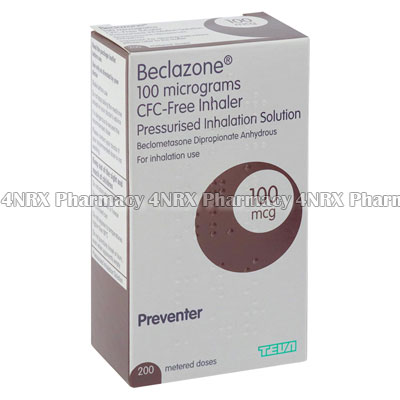 |
Home  Asthma Asthma  Beclazone (Beclomethasone Dipropionate) Beclazone (Beclomethasone Dipropionate) |
|
|||||||||
|
|
Beclazone (Beclomethasone Dipropionate)
What is Beclazone (Beclomethasone Dipropionate) used for? Beclazone Inhaler (Beclomethasone Dipropionate) is an inhalable corticosteroid prescribed to treat patients with asthma. It is inhaled into the lungs and operates by relaxing the airways to allow easier respiration and to prevent potential acute attacks. Please note that this is meant as a long-term treatment and will not be effective for relieving attacks as they occur. Always keep an emergency inhaler on hand for this reason. You may be prescribed to combine this medication along with others or to treat other unlisted conditions. How should I use Beclazone (Beclomethasone Dipropionate)? Strictly follow your doctor`s instructions to make sure you are using Beclazone (Beclomethasone Dipropionate) correctly. It is normally prescribed to be administered twice each day at a dosage of one spray. Your individual dosage may be different as it is based on your current health condition, symptom severity, and response to other treatments. Do not self-medicate or alter these directions to avoid causing unexpected health problems. Gently shake the inhaler to mix the contents prior to application. Remove the mouthpiece, exhale deeply, put your mouth on the mouthpiece, and inhale deeply while dispensing one spray. If another dosage is required, wait several minutes before dispensing it to avoid unnecessary throat or nose irritation. You are also recommended to administer the doses at the same times each day to get the most efficient results by keeping a consistent level of medicine in the body at all times. Attend any recommended appointments with your prescribing doctor to make sure the medicine is having the desired effects. After observing your response to the regimen, it may be necessary to adjust your dosage or application frequency until the best results occur. If you have any questions about your treatment, ask you doctor or pharmacist to ensure the correct usage. What are the side effects of Beclazone (Beclomethasone Dipropionate)? As with any treatment, the use of Beclazone (Beclomethasone Dipropionate) can cause side effects in some patients. These can be mild or severe and will not occur in all users. If you do experience any symptoms that are intense or worry you, inform your doctor immediately in case it is necessary to reduce your dosage or frequency of application to prevent further problems. If more serious health problems are indicated, emergency medical attention may also be required. Side effects that may occur are:
More serious side effects that need medical attention are:
Please Note Do not use Beclazone (Beclomethasone Dipropionate) if you are under eighteen years old, are allergic to beclomethasone, or if you have had a bad reaction to similar treatments in the past. Also inform your doctor if you have an overactive thyroid gland, diabetes, heart failure, hypertension, an irregular heart rate, a tumour affecting the adrenal gland, tuberculosis affecting the lungs, infections affecting the airways, low potassium levels, or severe liver disease. These conditions may require reduced doses or other changes to your treatment to prevent health problems from occurring. Strictly use this medication as prescribed and follow all instructions provided by your doctor. Safe, suitable, and optimum dosage can vary and is dependent on the patient`s health and medical history, as well as the condition you are treating. Beclazone (Beclomethasone Dipropionate) may not be safe or suitable for all patients. Always ensure your doctor is informed if you are pregnant or breastfeeding, using any other type of medication (including non-prescription medicine, vitamins, and supplements), as well as if you have any allergies, other illnesses, or pre-existing medication conditions. Seek immediate medical attention or proceed to your nearest accident and emergency department if you suffer a hypersensitive or allergic reaction. Symptoms usually present during a reaction of this nature include difficulty breathing or swallowing, swelling of the limbs or face, tight chest, hives, and skin rashes. 
|
||||||||||||||||||